High quality and mobility
This year, the highway industry is breaking records of sales and asphalt placement in Argentina, while companies renew their fleet of equipment: almost 50 high-output asphalt plants have entered the country in recent months. In all cases it is the most modern technology in this category. For example, near the city of Buenos Aires, Arrecifes, JCR S.A. recently installed a Magnum 160 MAX asphalt plant, the largest production model of the new Magnum MAX series launched by MARINI Latin America in March for the international market. This equipment, which now produces material for the resurfacing of the national route 8, is distributed in the Argentine market by Bamac S.R.L., a company that since 1992 has placed about 90 asphalt plants in the Argentine market.
GREATER PRODUCTION. LOW COST
The white line of Magnum plants (as that used by Rovella Carranza S.A recently to pave the Transchaco route in Paraguay) was already known for its successful implementation on country. However, to show the differentials in an apparent way “the new Magnum MAX plants incorporated the standard image in yellow, which is characteristic of the FAYAT Division and the name MAX, which represents the evolution in several components,” said Alberto Messina, sales manager from his Bamac office in Buenos Aires. In any case, according to the executive, despite offering many electronic innovations and integrated safety devices, the new MARINI plants maintains the original production concept established internationally to manufacture any type of high quality asphalt mix. Nowadays, the new series Magnum MAX is in conformity with the models that cover production ranges of 80-160 t / h. All equipment is very suitable for high performance, providing high mobility and ease of operation: “These machines are equipped with a fully automated control system, making the operation simple and intuitive, and guaranteeing excellent quality of the final product.” In addition, unlike other types of mills, “Magnum mills are very easy to assemble, disassemble and reposition, allowing great agility to paving contracts and especially to contractors who need to cover multiple work fronts,” said Messina.
In other words, unlike fixed plants, MARINI plants are mounted on a tire wheel chassis, consolidating a totally mobile design and guaranteeing, besides economic displacement, a significant reduction of civil works and labor. Similarly, “they operate in a small area, where it is only necessary to compaction of an installation base. When the work is completed, the equipment is connected to a truck and changes position,” concluded the local distributor. It should be noted that the Magnum MAX series backflow system ensures the desired drying and temperature of any aggregate for subsequent mixing with the binder while the dryer design ensures that the RAP does not come into contact with the burner flame. It is also noted that these plants use an air filter equipped with Nomex sleeves and a mixer capable of working with all types of conventional and modified asphalts and also hot blends with the efficiency and accuracy provided by the Hauck burner, recognized worldwide as a of the best in the industry.
MAGNUM MAX MARINI SERIES
The BOMAG MARINI Latin America factory (formerly Cifali & Cia, CMI Corp. and Terex), which today is represented by Bamac SRL, is located in the city of Cachoeirinha in Brazil and, since 2013, belongs to the road construction division of FAYAT Group, supplier of a wide range of road construction equipment, which also has the know-how of other prestigious factories as MARINI (Italy) and BOMAG (Germany). Thus, all teams in the FAYAT group use advanced technologies and meet the most demanding criteria in terms of reliability, safety, profitability and environmental protection. The company continues to develop solutions relevant to the equipment industry, road construction and asphalt processing and treatment.
INNOVATIONS
Basically, the asphalt industry uses plants that make the material to the specifications required through a process of metering, heating and mixing aggregates. The Magnum MAX equipment that MARINI has just launched in the international market are continuous and mobile type plants with very fast displacement and installation. This characteristic emphasized Messina, “makes them ideal to meet customers who demand asphalt mix production in a continuous and efficient way, due to their easy movement, keeping operating costs low and without neglecting quality or safety.” Likewise, considering the new technologies developed by the road industry, new projects should foresee, for example, the possibility of working with filler (hydrated lime or cement) or fibers and that is why in Magnum MAX plants, the mixer has a side window. BOMAG MARINI Latin America’s engineering also emphasized that the use of recycled material (RAP) is increasingly consolidated in the markets as a sustainable and economically advantageous application. In order for the Magnum MAX line plants to have standard RAP (ring) access in the dryer, they can process up to 30% of this material, while the dryer design ensures that the RAP does not come into contact with the burner flame, causing the gases generated in the heat exchange between the RAP and the hot virgin aggregates to incinerate before going towards the bag filter. Some applications require heat exchange between hot aggregates and fibers (to produce SMA). For this purpose, the use of the recycling ring is the most appropriate manner depending on the dry mixing time between the components. It is worth mentioning that the return drying system and the air filter equipped with Nomex sleeves ensure greater durability as well as the possibility of working at higher temperatures, such as those required in blends with polymer-modified asphalt.
ENVIRONMENT AND SECURITY
Among built-in technologies that preserve the environment, these machines are equipped with a filter system (bag filter) that retains the solid particles from the drying and incorporates them in the mixture, avoiding the discharge into the atmosphere. In the case of Magnum plants, the new filter element system guarantees an emission of particles of less than 50 mg / Nm3, according to international standards. Already in operation, the process through the bag filter is performed in two steps. The first particulate retention is produced in the dryer with the Venturi system, where particles larger than the # 200 sieve are stored due to the low gas velocity and are reintroduced into the blending process, directly into the dryer. The second particle retention stage is performed at the inlet of the bag filter, which has a high mechanical strength plate and receives the smaller particles through the # 200 sieve. This system slows down the gases that will continue with the fines to the elements Filters. The process of cleaning the sleeves is carried out by means of valves with pulse of compressed air. Also in consideration of those working near a Magnum factory in terms of safety, protections for all moving parts have now been included in order to avoid accidents during the plant’s production process. In addition to having the possibility of manual operation, the flexibility of operation with the automatic system is simple to use.
MOBILITY AND ECONOMY
The MARINI Latin America Magnum plants were developed in a single, fully mobile, towable design chassis that is capable of traveling on Argentinean routes, ensuring easy and economical transportation between works, and this design is also an excellent solution for the reduction of civil works in its location, requiring less use of work. The Magnum Series also has lower maintenance costs and longer durability of its components, ensuring the plant’s profitability over its lifetime; for example, the fins can be removed and / or added to provide a perfect fit for any application, and the all-blade blender made of special high-wear-resistant steel has a service life of up to 300,000 tonnes of production. Incidentally, remote factory access is also planned for diagnostics and software upgrades.
THE MAGNUM 160 MAX COMPACT FOR YOUR DISPLACEMENT
EFFICIENT DOSAGE OF THE ACID
As reported by the factory, aggregate dosing at a Magnum MAX plant is individual and through centralized load cells, motor-driven and speed-controlled by frequency inverter to ensure the correct proportion of aggregates. Depending on the configuration and model, a MARINI Magnum MAX series plant may have 3 to 5 bins with individual volumes between 6 and 10 cubic meters. The general characteristics of the system are:
- CANopen network communication
- Mechanical shock absorber with adjustment for aggregate weighing
- High efficiency in dynamic weighing
- Individual centralized load cell for each weighing silo
- Design that facilitates the supply of aggregates and with optimal angle for the flow of material Ampla Wide opening for power units
- Gear motor installed on the front roller, variable speed per frequency converter
- Automatic vibrator in silo 01 (standard) and optional in other silos Plan Flat dosing belts with vulcanized sides
- Vibrating screen (optional)
The equipment that is operating in Arrecifes (in the image, silos of the plant Magnum 160 MAX of JCR SA) is mounted on 3 axles and 12 tires, comes as standard with 4 separate compartment distributors and mounted in another 1-axis chassis, type of reflux and filter of sleeves of 480 units (Nomex). Also comes with ring for entry of recycled material. According to the manufacturer, this plant can produce up to 160 t / h, it is worth clarifying that the production of the plant is variable and depends on several factors, such as the humidity of the aggregates, altitude of the installation site, percentage of fines of the mixture, temperature of the mixture, calorific value of the fuel and specific charge of the aggregates.
Source:
El Constructor Magazine, October, 23, 17, pages 55 e 56.
Available Download on the upper right side.
M&T Magazine, Ed. 219, pages 42 a 48.
Available: http://www.revistamt.com.br/index.php?option=com_conteudo&task=viewEdicao&edicao=219

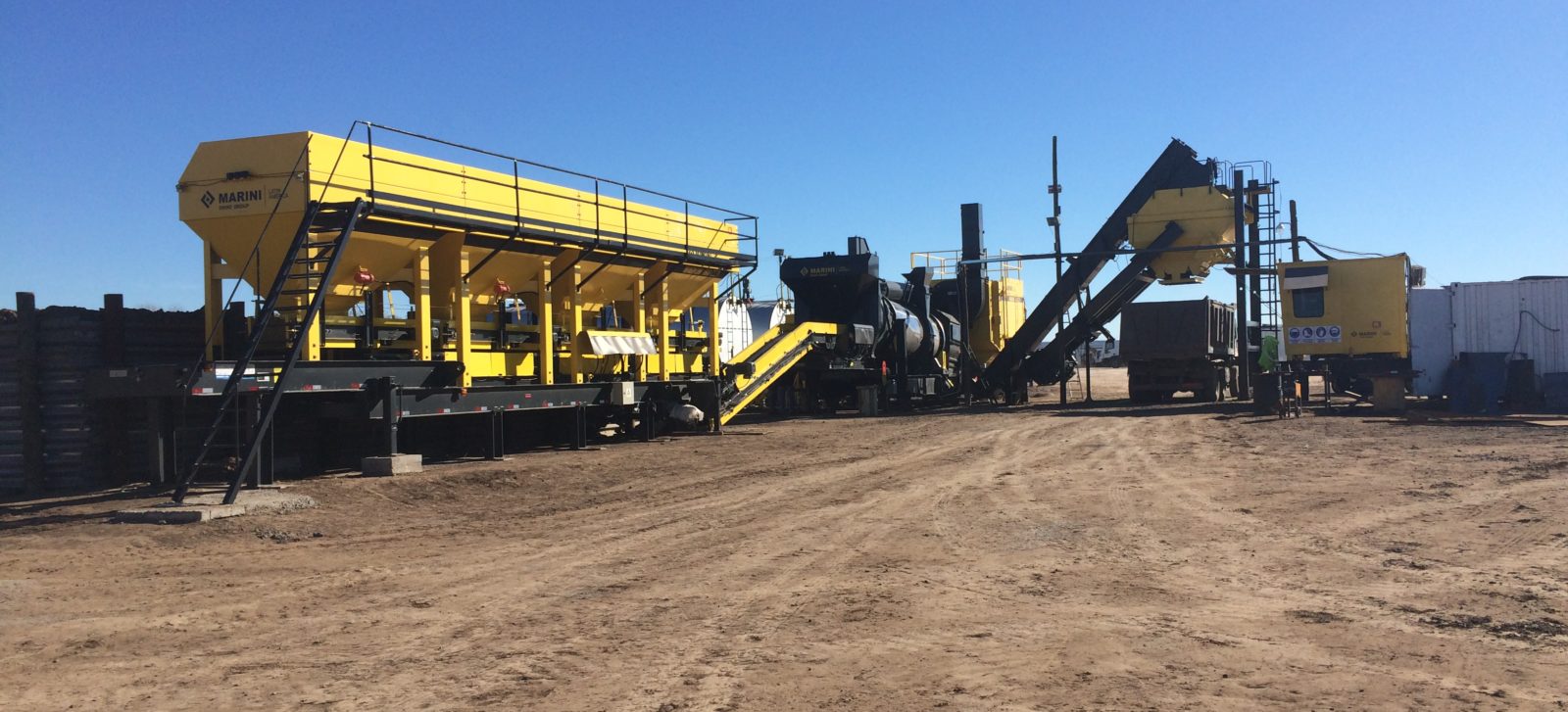
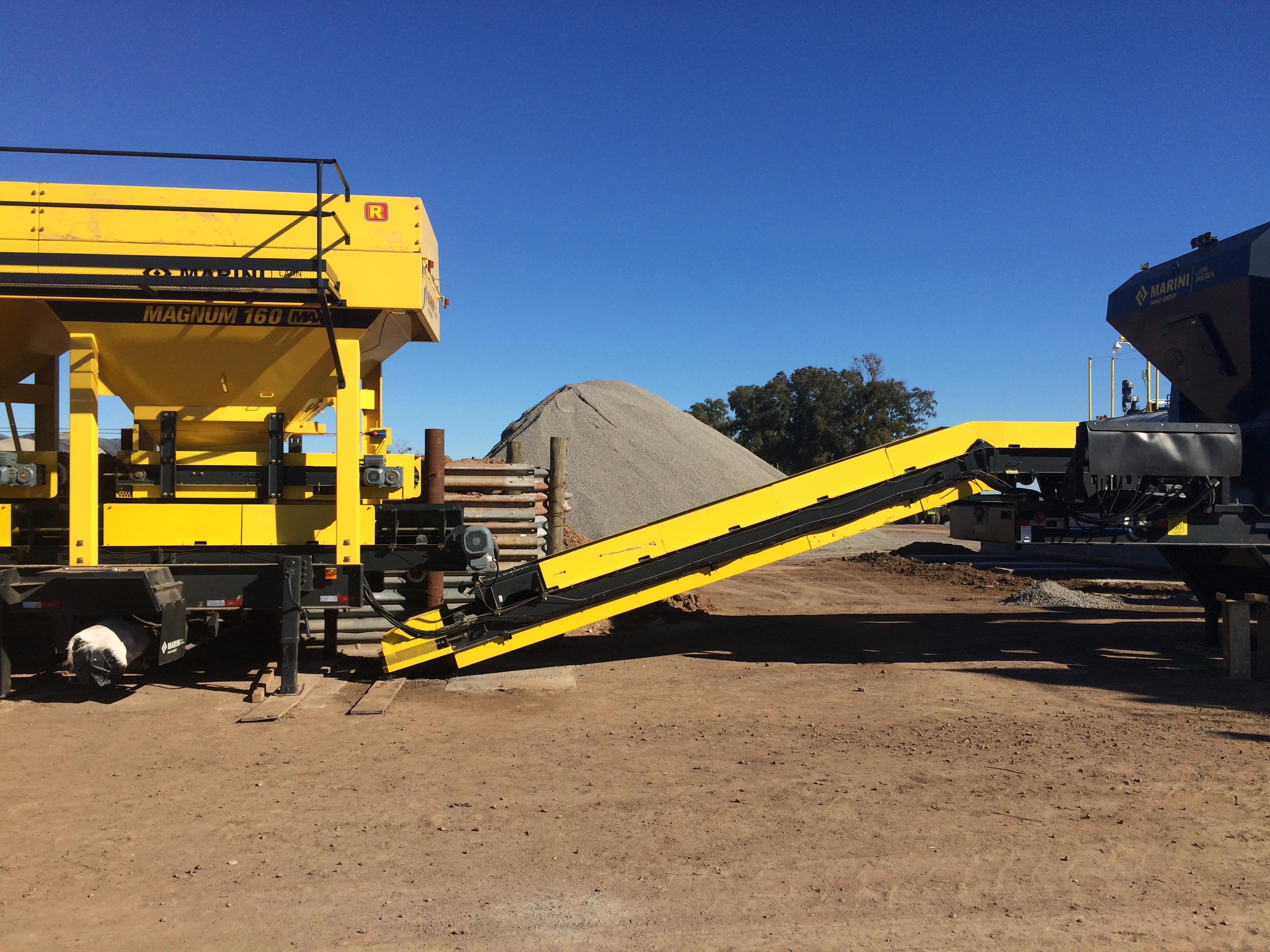
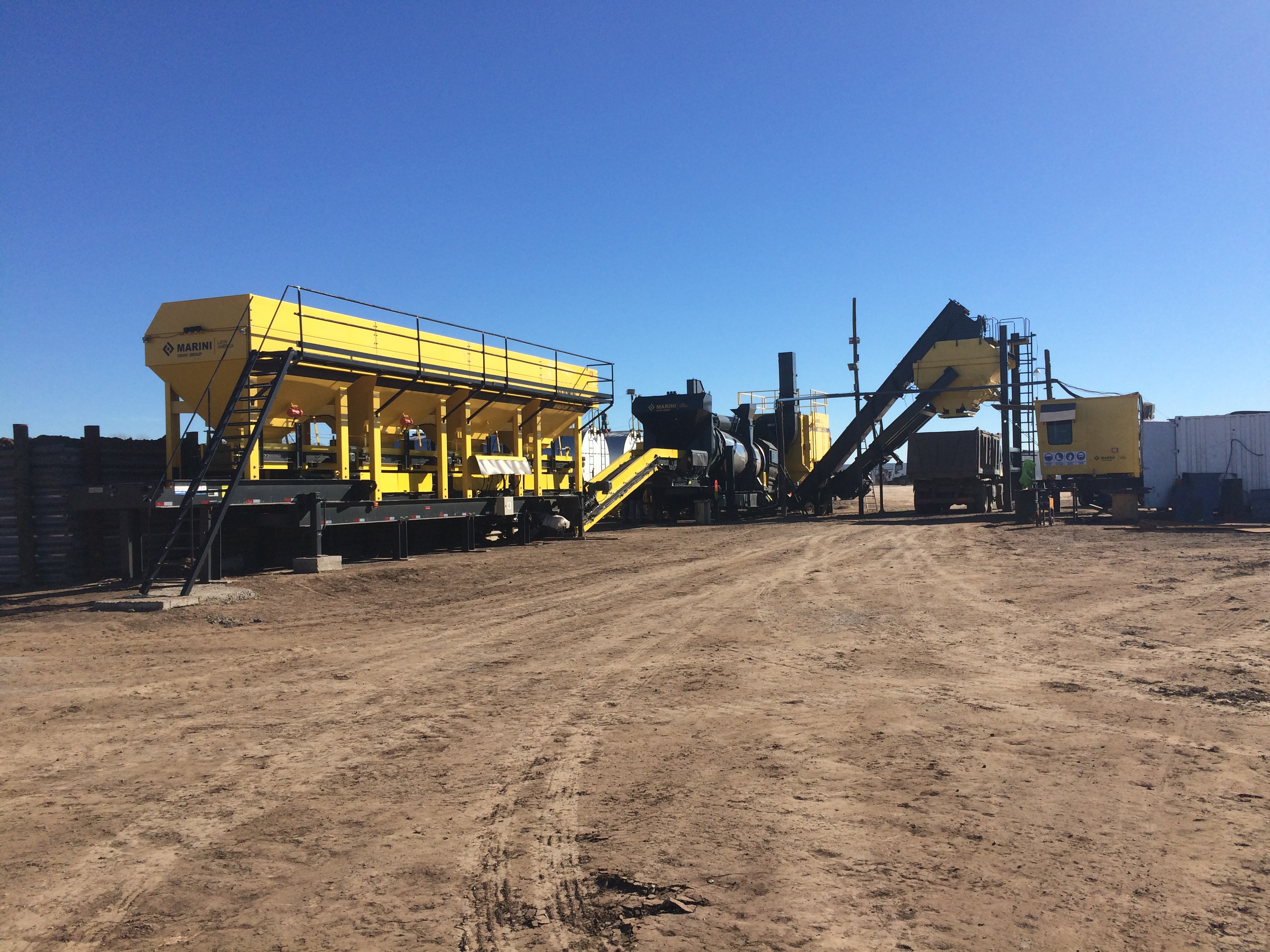
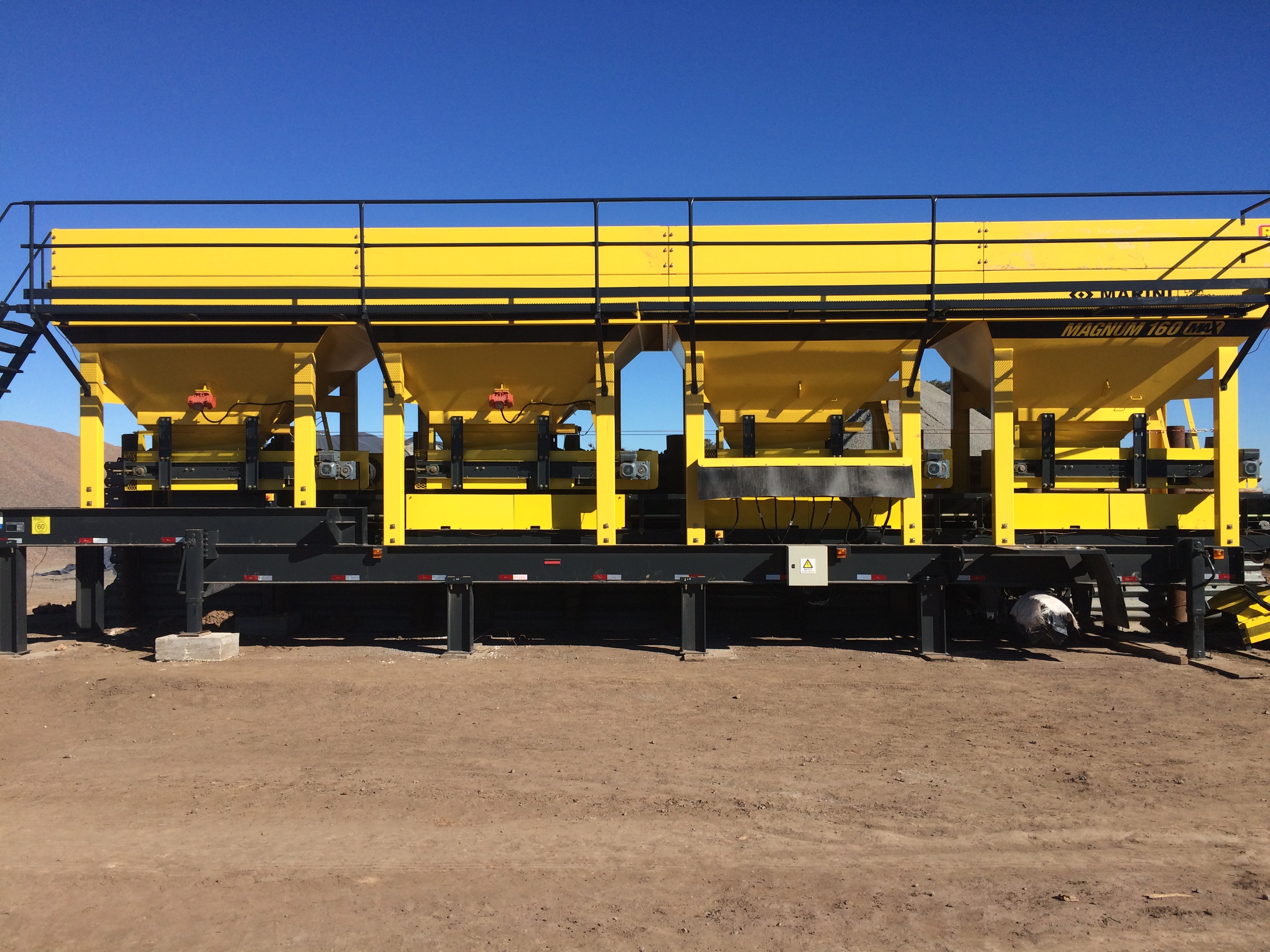
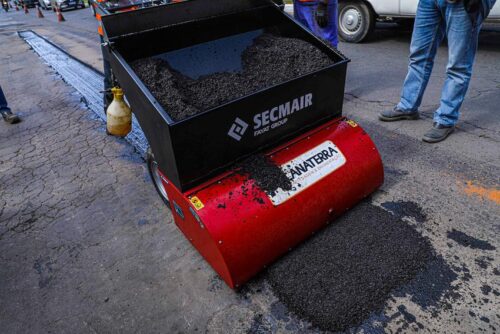

 After-sales support
After-sales support